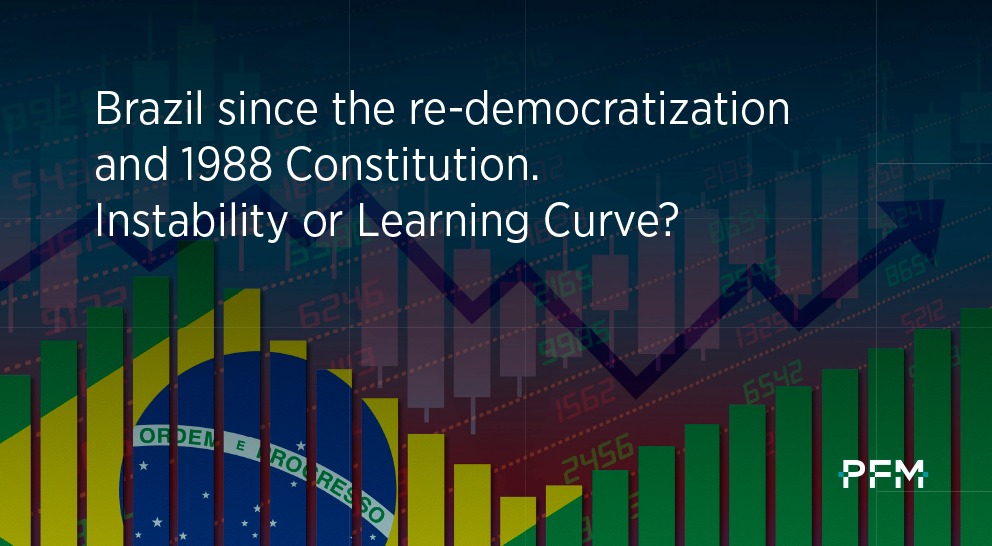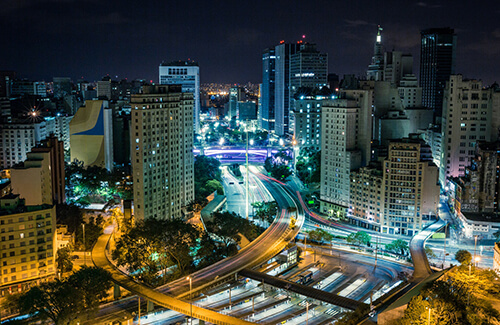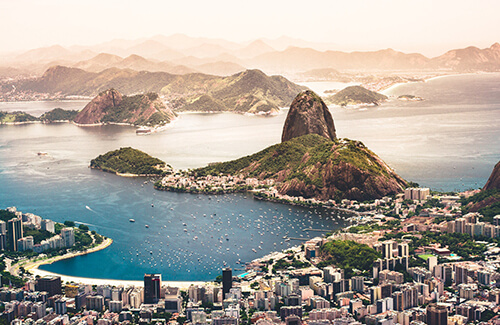In continuation of our series of articles addressing our recent political/economical history, as well as the challenges that lie ahead of us, please find below some information on our country since the re-democratization (1985) and enactment of our current Constitution (1988).
A few facts of our history
- Brazilian Constitution was enacted in 1988;
- It followed an indirect presidential election in 1985, in which the president-elect (Tancredo Neves) died before taking the office;
- The vice-president elect (José Sarney) took the office with no intervention from military forces, which have ruled the country in a dictatorship that began in 1964 (21 years);
- The first free presidential election since the 60’s was held in 1989 and a politician from a small state won it with a right-wing speech;
- He was impeached two years after taking office as a result of corruption scandals;
- At that time, Brazil had one of the highest ever inflations of world history and all the economic plans implemented by these two administrations did not result in success, but actually the opposite;
- Brazil was an international debtor, with a moratoria record in the 80’s, with the foreign debt only beginning to be actually negotiated in the early 90’s
And what happened in the last three decades?
Based on the facts above, imagine someone in 1988. Looking to the future, would he/she imagine that:
- A new economic plan/currency (Real) was successfully introduced in 1994 and inflation since then has been 7% p.y. on average;
- Just as a comparison, between 1939 and 2013 the accumulated inflation was of staggering 3.899.556.304.251.250% (an average of 94% p.y.);]
- From a political perspective, Brazil would be enjoying its longest democratic period since we became a republic in 1889. In numbers, 8 consecutive free presidential elections have been held since 1989;
- Five presidents were elected (Collor, FHC, Lula, Dilma and Bolsonaro);
- Two of them were impeached: Collor, in his first mandate, as a result of corruption scandals, and Dilma, in her second mandate, due to illegal acts in connection with our Fiscal Responsibility legislation, which regulates the federation budget;
- Both impeachments involved the Supreme Court and the Congress;
- Brazil would be the stage of the world’s largest ever corruption fighting task force, with billions of dollars that were deviated being recovered and a high number of tycoons and high profilers been sent to jail, something that one could agree is not common in Latin America. Note that this also did not involve violence (as we have seen in Italy, for example);
- Back to economics, after being rescued by the WMF in 1997 with USD40B to recoup its foreign currency reserves, which made our currency weak amongst many international crises at that period (Russia, Mexico, Asian Tigers, etc.), Brazil would amass foreign reserves that are currently around USD380B;
- This means that we are among the largest global holders of US bonds and also that we have settled our public foreign debt (Note: yes, there are still foreign bonds, but a small part in comparison with our gross public debt, which is due internally, in Reais; And also yes, there is private debt from companies that borrow from overseas);
- In accordance with research from EY, Brazil has been one of the Top 5 destinations of FDI in recent years, with an inflow of investments that has ranged from USD65 to 85B per year, even in the most acute periods of our self-inflicted recession of 15/16;
- São Paulo is the second city in the world in number of multinational companies’ offices, just after NYC. The same happens with the number of corporate helicopters fleet, as examples;
- Brazil would develop its energy sector to have one of the most diversified energy matrices in the world, while also becoming a top 10 worldwide Oil producer;
- We would have held back to back Soccer’s World Cup and Olympics in 14/16 (both successful events), something that just the US has done before (94/96).
- Common economic researches indicate that Brazil will remain as one of the World’s Top 10 economies (by GDP) in the decades to come.
So, based on what you have read above, would you say that Brazil has generally performed better or worse in comparison to other countries?
Would you agree that the World’s axis has changed?
Also, in which countries would you place your bets for the upcoming decades when it comes to your businesses?
Should you like to further discuss the subjects above and how we can help you navigate Brazil business environment, please do not hesitate to contact our team (This email address is being protected from spambots. You need JavaScript enabled to view it.). In our article next week (the last of this series) we will address the challenges that lie ahead of Brazil to realize its potential.


